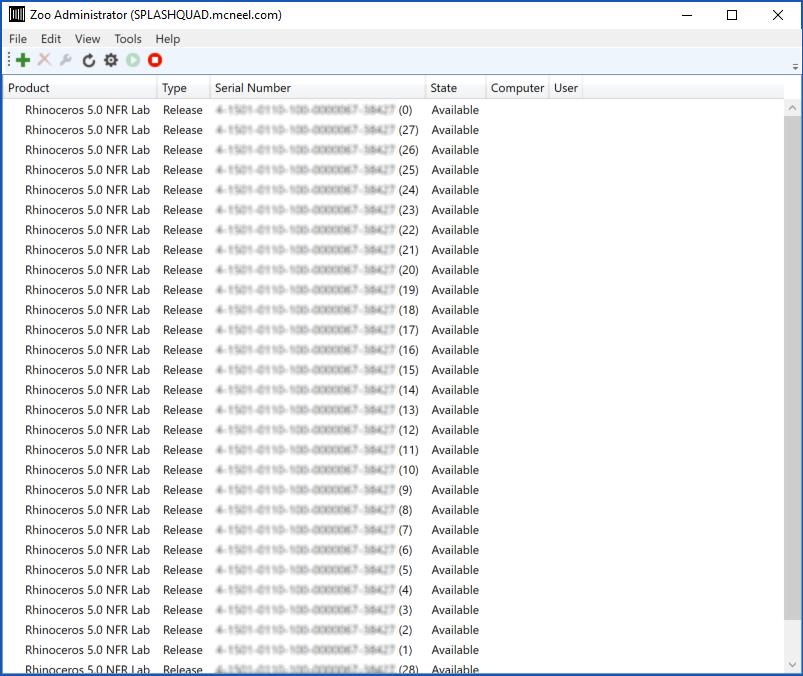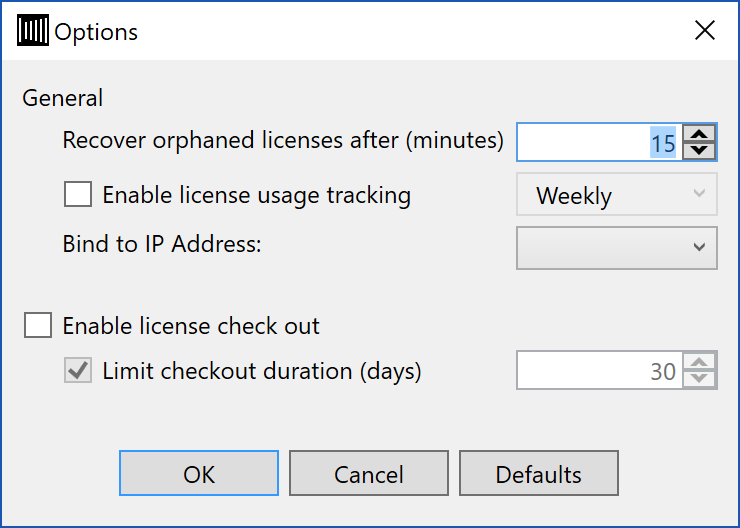Managing Zoo Licenses
Licenses can be managed by running the Zoo Administrator (ZooAdmin.Wpf.exe).

Zoo licenses have three states, check can be viewed in the Zoo Administrator:
- Available - the license is not in use.
- In use - the license is loaned out, or in use.
- Checked out - the license has been checked out on a semi-permanent basis.
Adding Licenses
When you add a Rhino license to the Zoo, you will be asked to validate the license online. Rhino licenses must be validated before they can be used.
Critical: if you are upgrading from Rhino 5 to Rhino 6, or from Rhino 4.0 to Rhino 5, you need to keep track of which previous version CD-Key you used to upgrade. You can only use each previous version CD-Key once.
The only piece of information used during license verification is your CD-Key, which is included when you buy Rhino.
Registration is not required, nor is any personal information. No computer-specific information, or information derived from your computer is sent to Robert McNeel & Associates.
To add licenses to the Zoo, run the Zoo Administrator (ZooAdmin.Wpf.exe), and then click Edit → Add.
- Select your product type from the drop down list.
- Enter the registered owner and organization of the product.
- Enter your licence code or CD key.
- Click OK begin license validation.
- Enter your E-mail Address
- Enter Previous Version CD-Key (Upgrade Only)
- Enter Registration Information (Optional)
- Validation Complete
Recovering Licenses
The Zoo will automatically recover loaned licenses due to either network interruption or abnormal product shut down.
There may be an occasion where you will be required to do this manually. To recover an “in use” license, select the license from the list and then click Edit → Recover.
Note, recovering licenses that are still in use can lead to license conflicts.
Checking In Licenses
The Zoo can allow licenses be checked out, on a semi-permanent basis, so laptop users can disconnect from the network. The licenses can be checked in again when the laptop is reconnected to the network.
There may be an occasion where you will be required to do this manually. To check in a checked out license, select the license from the list and then click Edit → Recover.
Note, checking in licenses that are still checked out can lead to license conflicts.
Remote License Monitoring
The Zoo allows administrators and users to monitor license usage from the convenience of their web browser. Just visit the “status” page provide by your Zoo server by entering:
http://<zoo_server_host_name>/status
into your favorite web browser. For example, if your Zoo server’s host name is zooserver.mycorp.com, then you’d enter:
http://zooserver.mycorp.com/status
Exporting Serial Numbers
The Zoo can export a comma-separated-value (.CSV) file that contains the serial numbers (not CD keys) of all licenses maintained by the Zoo. This can be useful if you have difficulties in locating all of your product CD keys. You can export the serial number and then e-mail them to McNeel, who in turn can look up your misplaced license information. To export serial numbers, click File → Export.
File Locations
Zoo License Location
The Zoo stores licenses in the following folder:
%PROGRAMDATA%\McNeel\Zoo\6.0\Licenses
Note, Zoo license files cannot be moved from Zoo server to another Zoo server.
Also note, it is not possible to recover lost product license codes or CD keys from the Zoo. So, make sure to store your product license codes and CD keys in a safe location.
Zoo Usage Tracking Files
The Zoo stores usage tracking files in the following folder:
%PROGRAMDATA%\McNeel\Zoo\6.0\Usage
Zoo Options
To configure Zoo options, run the Zoo Administrator (ZooAdmin.exe), and then click Tools → Options.

General
Rhino and Rhino-based products update their license status, with the Zoo, every 5 minutes. If a license fails to be updated for the specified duration, because of either network interruption or abnormal product shut down, then the license will be considered orphaned and automatically recovered so other users can access it.
Recover orphaned licenses after minutes
This parameter specifies how long the Zoo will wait before recovering orphaned licenses. The default value is 15 minutes.
Enable license usage tracking
The Zoo is capable of recording licensing activities for the purpose of tracking product usage. These records can then be used to generate statistics for accounting or billing purposes.
The Zoo records license activities in Comma-Separated-Value, or CSV, text files. These files can be viewed with any text editor, such as Windows Notepad, or imported in products such as Microsoft Excel for sorting and analysis.
Zoo usage tracking files contain the following information:
- Date - The date and time of the transaction.
- Type - The type of transaction:
- License loaned out - A license was loaned out.
- License returned - A loaned out license was returned.
- License checked out - A license was checked out.
- License checked in - A checked out license was checked in.
- License recovered - An orphaned license was automatically recovered.
- License check out expired - A checked out license was automatically checked in because the check out duration expired.
- License expired - An existing license has expired and had been deleted.
- License added - A new license was added using the Zoo Administrator.
- License deleted - An existing license was deleted using the Zoo Administrator.
- Administrator returned - A loaned out license was returned using the Zoo Administrator.
- Administrator checked in - A checked out license was checked in using the Zoo Administrator.
- License status updated - The status of a license was updated.
- Unknown - An unknown event has occurred.
- Computer - The system involved in the transaction.
- User - The user logged into the system during the transaction.
- Product - The product used for the transaction.
- Total - The total number of licenses maintained by the Zoo for that product.
- Used - The total number of licenses for that product that are in use after the transaction.
To view the usage tracking files, from the Zoo Administrator, click Tools → View Tracking.
Usage tracking file rotation
Allows you to specify the period of the usage tracking. That is, how often you want the usage tracking files rotated; either on a daily, weekly, or monthly basis.
Note, usage tracking files are named by the date in which the tracking file was created in a
The default value is to track usage on a weekly basis.
Bind to IP Address
By default, the Zoo uses all IP addresses on server system. If your server is using more than one IP address, and if you have other applications that require the use of TCP Port 80, then you can configure the Zoo to bind to only a single IP address.
Enable license check out
Licenses can be checked out, on a semi-permanent basis, so laptop users can disconnect from the network.
The licenses can be checked in again when the laptop is reconnected to the network.
If a license is checked out, it cannot be used by another system until it is checked back in.
To check out a license, launch Rhino, click Tools → Options → Licenses.
The default value is to have license check out disabled (unchecked).
Limited checkout duration
When a license is checked out, it is done so for an unlimited duration. With limited checkout enabled, checked out licenses will automatically checked in after the specified duration has elapsed.
The default value is to have limited license check out disabled (unchecked).